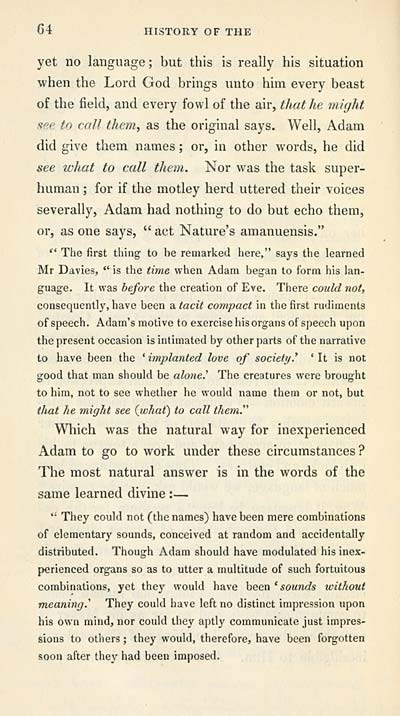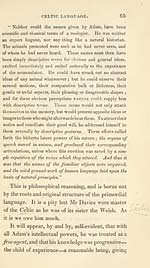Download files
Complete book:
Individual page:
Thumbnail gallery: Grid view | List view

64 HISTORY OF THE
yet no language; but this is really his situation
when the Lord God brings unto him every beast
of the field, and every fowl of the air, that he might
see to call them, as the original says. Well, Adam
did give them names ; or, in other words, he did
see what to call them. Nor was the task super-
human ; for if the motley herd uttered their voices
severally, Adam had nothing to do but echo them,
or, as one says, " act Nature's amanuensis."
" The first thing to be remarked here," says the learned
Mr Davies, " is the time when Adam began to form his lan-
guage. It was before the creation of Eve. There could not,
consequently, have been a tacit compact in the first rudiments
of speech. Adam's motive to exercise his organs of speech upon
the present occasion is intimated by other parts of the narrative
to have been the ' implanted love of society/.* ' It is not
good that man should be alone.' The creatures were brought
to him, not to see whether he would name them or not, but
that he might see (what) to call them."
Which was the natural way for inexperienced
Adam to go to work under these circumstances ?
The most natural answer is in the words of the
same learned divine : —
" They could not (the names) have been mere combinations
of elementary sounds, conceived at random and accidentally
distributed. Though Adam should have modulated hisinex-
I>erienced organs so as to utter a multitude of such fortuitous
combinations, yet they would have been ' sounds without
meaning.' They could have left no distinct impression upon
his own mind, nor could they aptly communicate just impres-
sions to others ; they would, therefore, have been forgotten
soon after they had been imposed.
yet no language; but this is really his situation
when the Lord God brings unto him every beast
of the field, and every fowl of the air, that he might
see to call them, as the original says. Well, Adam
did give them names ; or, in other words, he did
see what to call them. Nor was the task super-
human ; for if the motley herd uttered their voices
severally, Adam had nothing to do but echo them,
or, as one says, " act Nature's amanuensis."
" The first thing to be remarked here," says the learned
Mr Davies, " is the time when Adam began to form his lan-
guage. It was before the creation of Eve. There could not,
consequently, have been a tacit compact in the first rudiments
of speech. Adam's motive to exercise his organs of speech upon
the present occasion is intimated by other parts of the narrative
to have been the ' implanted love of society/.* ' It is not
good that man should be alone.' The creatures were brought
to him, not to see whether he would name them or not, but
that he might see (what) to call them."
Which was the natural way for inexperienced
Adam to go to work under these circumstances ?
The most natural answer is in the words of the
same learned divine : —
" They could not (the names) have been mere combinations
of elementary sounds, conceived at random and accidentally
distributed. Though Adam should have modulated hisinex-
I>erienced organs so as to utter a multitude of such fortuitous
combinations, yet they would have been ' sounds without
meaning.' They could have left no distinct impression upon
his own mind, nor could they aptly communicate just impres-
sions to others ; they would, therefore, have been forgotten
soon after they had been imposed.
Set display mode to: Large image | Transcription
Images and transcriptions on this page, including medium image downloads, may be used under the Creative Commons Attribution 4.0 International Licence unless otherwise stated. ![]()
| Early Gaelic Book Collections > Blair Collection > History of the Celtic language > (70) |
|---|
| Permanent URL | https://digital.nls.uk/76179379 |
|---|
| Description | A selection of books from a collection of more than 500 titles, mostly on religious and literary topics. Also includes some material dealing with other Celtic languages and societies. Collection created towards the end of the 19th century by Lady Evelyn Stewart Murray. |
|---|
| Description | Selected items from five 'Special and Named Printed Collections'. Includes books in Gaelic and other Celtic languages, works about the Gaels, their languages, literature, culture and history. |
|---|

